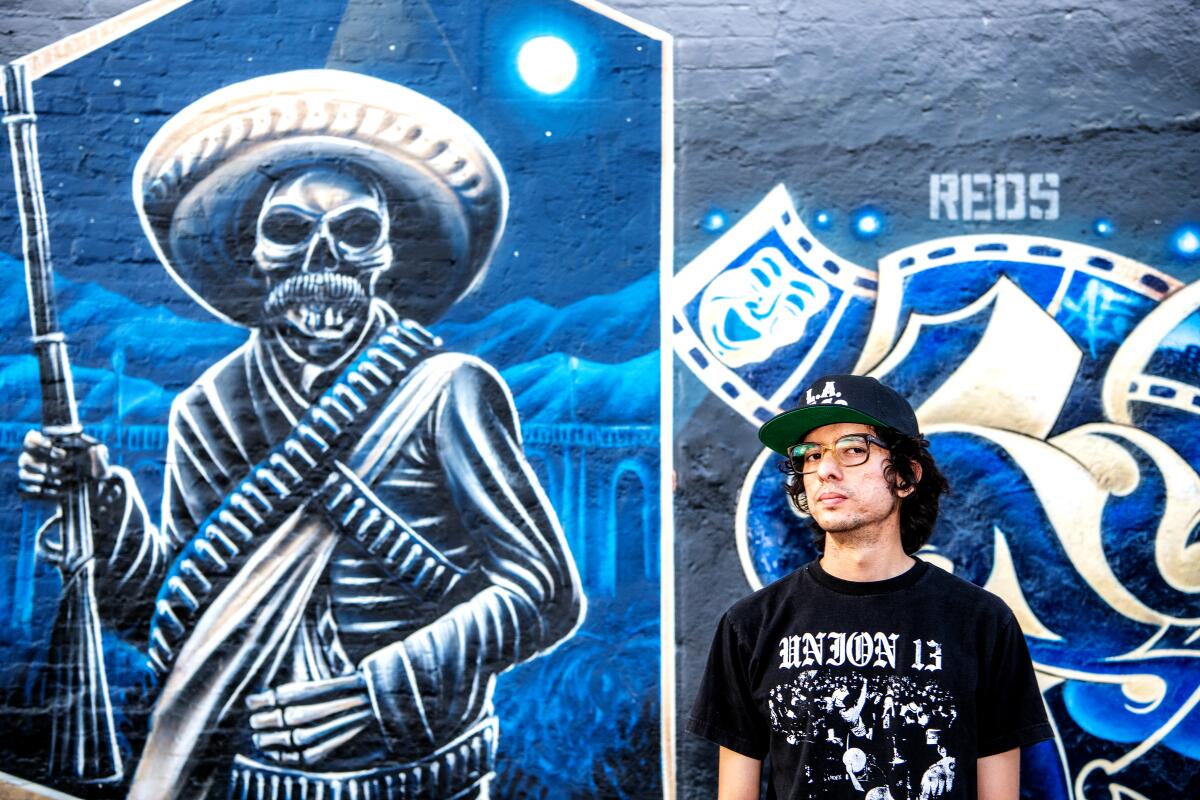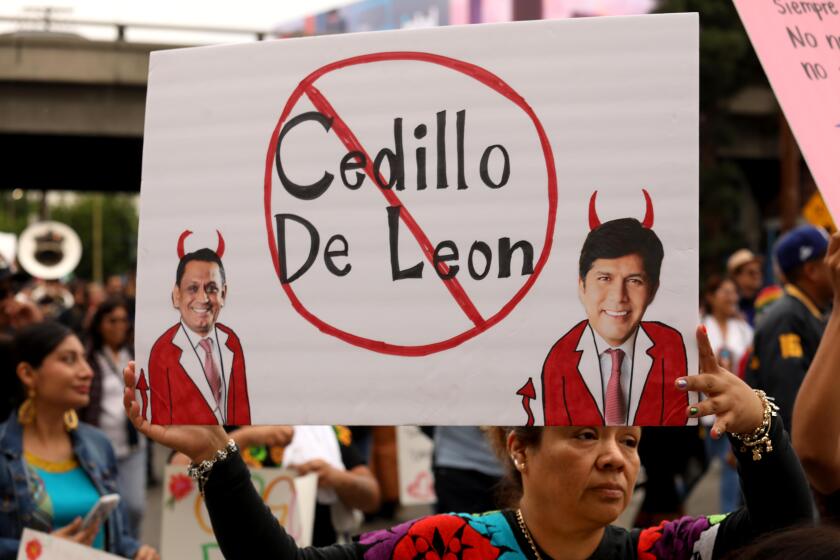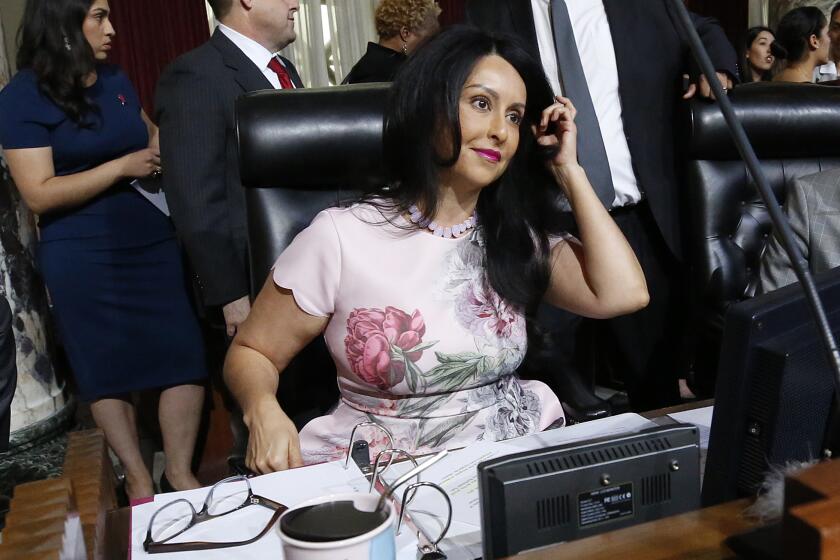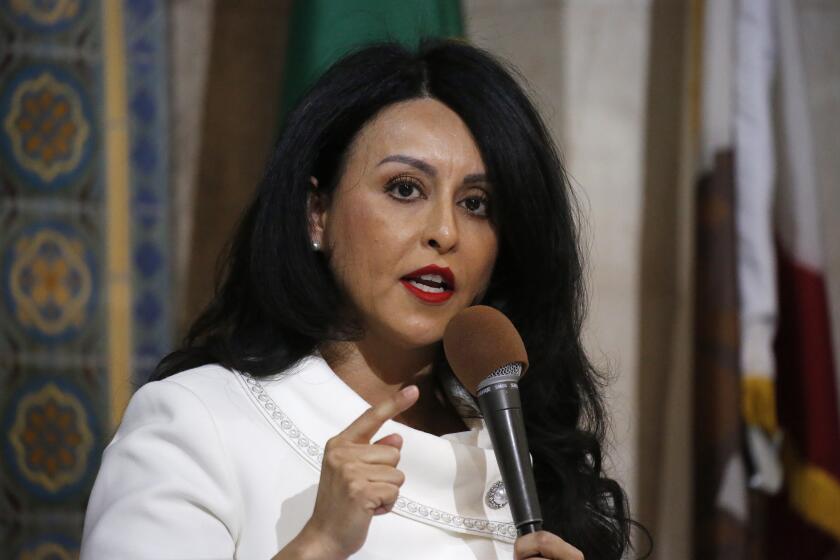Latino media grapples with how to cover the Nury Martinez scandal

- Share via
Javier Cabral had never been tested as L.A. Taco’s editor in chief like he was after audio leaked Oct. 9 of then-L.A. City Council President Nury Martinez making racist remarks.
As a tiny publication, there was no way L.A. Taco could overpower the larger media outlets covering the Latino civic leaders who had trashed a colleague’s Black toddler, Oaxacans and others in a secretly recorded 2021 meeting about redistricting.
But the “street-level angle” that has made L.A. Taco a beloved media underdog became apparent when investigative reporter Lexis-Olivier Ray saw a tweet asking for a list of Oaxacan restaurants to support in Koreatown.
“As soon as he said it, I was like, ‘Bam!’ That was it,” Cabral said. “That was our story.”
In podcasts, newspaper columns and on indie sites over the past week, Latino journalists have been dissecting the audio’s Spanglish, exploring niche angles and trying to promote solidarity after L.A. Councilmembers Martinez, Gil Cedillo and Kevin de León were caught candidly discussing redistricting as a zero-sum racial struggle for power.
This wasn’t just a Watergate moment for a slice of L.A.’s political elite. For some Latino-centered media outlets, the recordings were an MRI that revealed some ugly masses long festering in the body politic: anti-Blackness and anti-Indigenous racism.
In addition to denouncing the politicians and demanding their resignations, it’s been a time for them to look inward and elevate the voices of Black Latino and Indigenous voices long ignored by mainstream Latino media.
“To remedy the situation, the Latino political class in our city has to renew its bond with the people,” the editorial board of La Opinión, a Spanish-language newspaper in Los Angeles, wrote in an editorial denouncing the remarks by all three City Council members a day after the audio was published.
L.A. Latinos decry racist tape and fear it will set back leadership gains and cast them under a cloud of suspicion. Some say it exposed the need to have a conversation about colorism.
“We must be aware of this casual racism that is widespread in our own community, which seems harmless but is not and must be firmly condemned,” the board wrote.

In an Oct. 12 episode titled “Latinidad is dangerous,” L.A.-based podcast hosts Zoe “Mala” Muñoz and Ariana “Diosa” Rodriguez of “Locatora Radio” reacted to the leaked recordings with horror and reflected on their own responsibilities to fight racism.
Muñoz surveyed the political surroundings: Half the city is Latino. Los Angeles County Sheriff Alex Villanueva is Latino. Los Angeles Mayor Eric Garcetti, whose grandfather was born in Mexico, “is some kind of a Latino.” The three City Council members caught on the recordings — Martinez, Cedillo and de León — were Latinos.
“As non-Black Latinos who speak Spanish or English or have citizenship or what have you, we have got to recognize our power, politically, economically, numbers-wise,” Muñoz said on the episode. “Our folks, who we’re related to, who look like us and have our last names and speak our language, are making horrifying decisions at the highest level. That’s where we need to be focusing.”
Rodriguez agreed.
“There have been so many instances — but this is obviously the current, most recent one — where it’s like, Latinos get a little bit of power, and they quickly act like the oppressor and quickly want to wield and hoard all the power,” Rodriguez said. “It’s not good. We should be coalescing, we should be coalition-building with our Black community in Los Angeles, the very large indigenous community in Los Angeles.”
The pair decried Martinez and the “chingona industrial complex” and invited Odilia Romero, director and co-founder of Comunidades Indígenas en Liderazgo (Indigenous Communities in Leadership), onto the show to talk about how to stand up to anti-Indigenous racism.
Much like English-language media, Spanish-language media has historically mistreated marginalized communities, said José Luis Benavides, a professor of journalism at Cal State Northridge.
“It has a record, especially with those communities that were vilified by these City Council members,” Benavides said.
But this time, Latino and Spanish-language media have used the moment to help the Latino community reflect on Martinez’s remarks, which unfortunately reflect not-uncommon sentiments, he said.
The moment has given visibility for Indigenous communities that have fought to be recognized for years, said Mireya Olivera, editor of Impulso, an L.A.-based publication that covers the Oaxacan community.
Celebrate L.A.’s Oaxacan restaurants in support of a community targeted by racist comments in leaked audio of city political leaders — best tlayudas, memelas, tetelas, cecina, tasajo and more.
The staff of eight reporters and editors, two of whom are based in Oaxaca, Mexico, has been closely covering the fallout of the audio leak.
Since 2004, they’ve covered the Oaxacan community as a hyperlocal news organization, covering high school graduations and basketball tournaments, Olivera said. They fill the gap often left by traditional Latino media, she added, which has long ignored communities like theirs.
Olivera has been surprised to see the degree to which Oaxacans are being highlighted in national news outlets and on broadcast television.
“Before, I wouldn’t have imagined this level of coverage,” Olivera said, but it is welcomed. “It is necessary and vital that mass media cover ethnic communities and see what is happening on the ground.”
Before, Latino media likely would’ve ignored the insults to Indigenous Oaxacans because they wouldn’t have cared about covering the community, said Laura Martínez, a Mexico-born blogger who has followed U.S. Latino media closely over the years.
In racist comments against Black and Indigenous people, Martinez exposed a blinkered tradition of defining the Latino community that may be on the way out.
But there has been a shift recently, reflected in how they are closely covering the story today. Martínez (who is not related to Nury Martinez) points to the generational shift, with younger Latinos being more willing to call out colorism in their communities than their parents, who may have grown up with racist language being normalized.
“When you’re born and raised in Mexico, you are raised listening to things like ‘el negrito,’ ‘la chinita.’ We think by making it diminutive it’s not going to sound as bad,” Martínez said.

Not everyone in Latino-centered media was united in denunciation.
In an Oct. 12 episode of “Rick Sanchez News,” host Sanchez, a former CNN correspondent once based in Southern California, defended Martinez as the victim of “cancel culture” who he felt was unfairly recorded without her consent and taken out of context as a Latina.
“Words in the Latino culture have a different meaning than they do in the English culture,” Sanchez, who is now based in south Florida, said in an interview with The Times. Sanchez’s show bills itself as “a podcast that shatters the stereotypes and misconceptions about Latinos in America.”
Martinez had referred to a fellow council member’s Black son with the Spanish word for “little monkey,” changuito, which many Spanish speakers have interpreted as racist. Sanchez, however, said the term “has a secondary meaning to describe a hyperactive child.”
“It comes down to context,” Sanchez said. “I never heard her disparage the child’s race. She was directly referring to his behavior, which leads to the possible if not reasonable conclusion that she used the term to describe his hyperactive nature.” Sanchez added, “If he was a Latino kid, she would have used the same word.”
Audio of Councilmembers Nury Martinez, Kevin de León and Gil Cedillo speaking with labor leader Ron Herrera quickly became a new and incendiary issue in the Nov. 8 election.
Sanchez said that Martinez was “out of line in much of what she said” and that she said “stupid” things.
“But this onslaught, this woman is being crucified,” Sanchez said. “She probably will never be able to work again, at least not in that town. I think it’s a bridge too far.”
Sanchez said, “I may be the only Latino in the United States standing by this woman,” but he argued that Latinos were often quick to tear each other down. He cited an old-school political parable among Latinos about crabs trapped in a bucket that prevent each other from escaping.
“I stand by my defense, because I know who we are as Latinos,” Sanchez said. “No one is going to come to this woman’s defense.”
Since the story broke, Cabral, the L.A. Taco editor, has experienced a range of emotions. First it was outrage. Then, embarrassment. Now, it’s sadness.
“Whether I want to admit it or not, I hear my L.A. accent in Nury Martinez and the way she was talking,” said Cabral.
Cabral has no doubt this will be one of the most defining scandals of L.A. political history. But there is a silver lining.
“Now we’ve had that moment to reflect, and we can call it out next time,” Cabral said. “Even when it’s somebody in your family table who uses a racist term casually. It’s just understanding that it’s not OK.”
More to Read
The biggest entertainment stories
Get our big stories about Hollywood, film, television, music, arts, culture and more right in your inbox as soon as they publish.
You may occasionally receive promotional content from the Los Angeles Times.

















